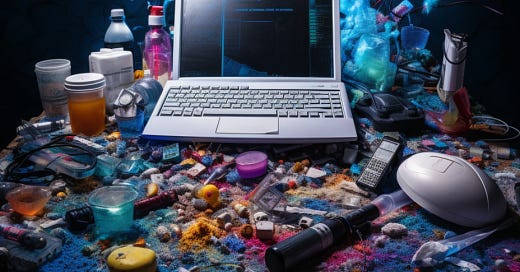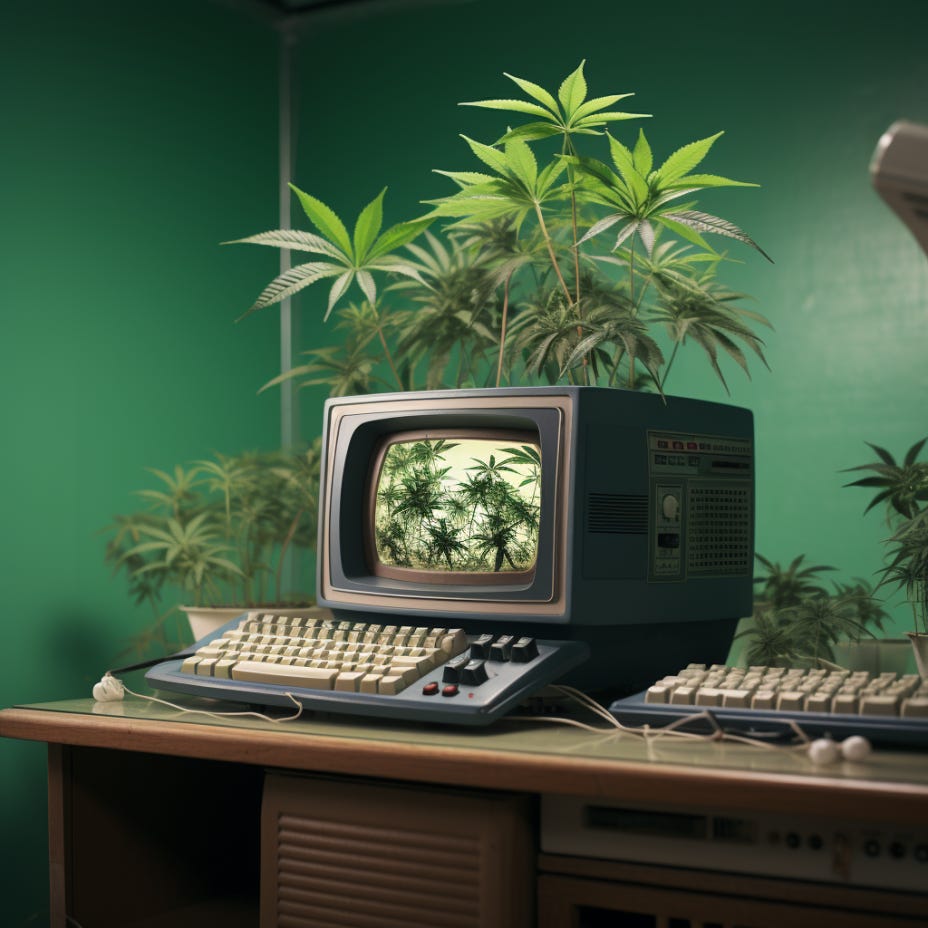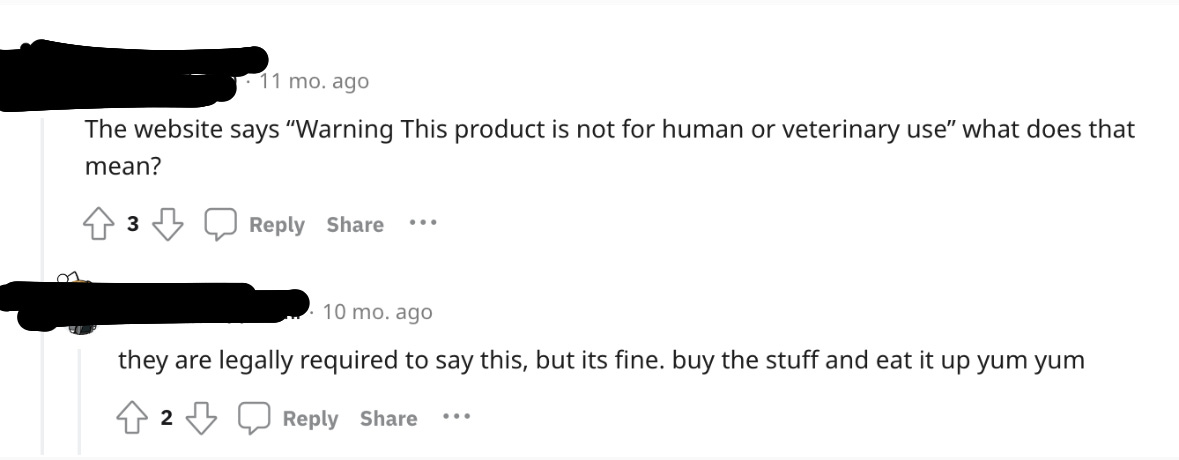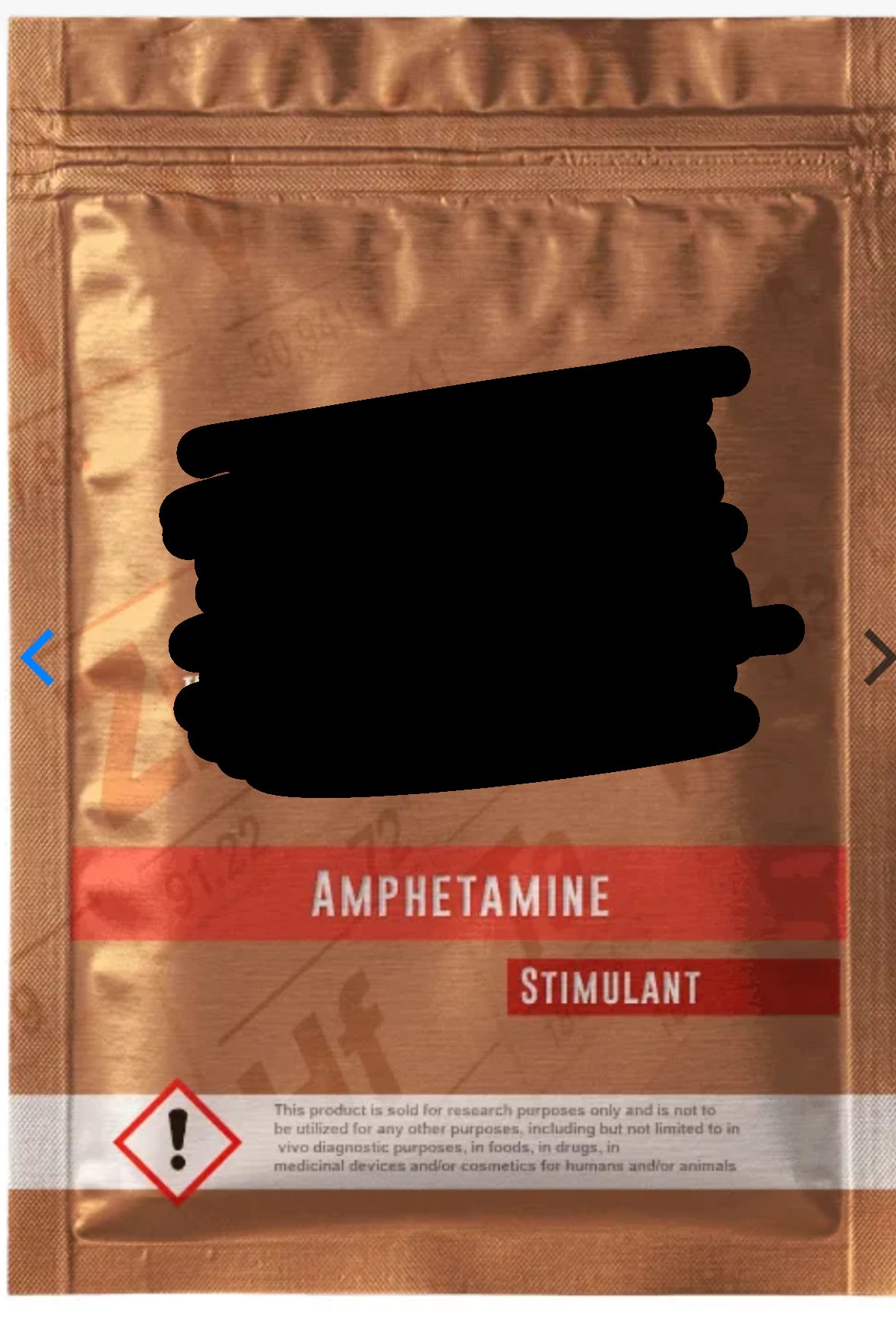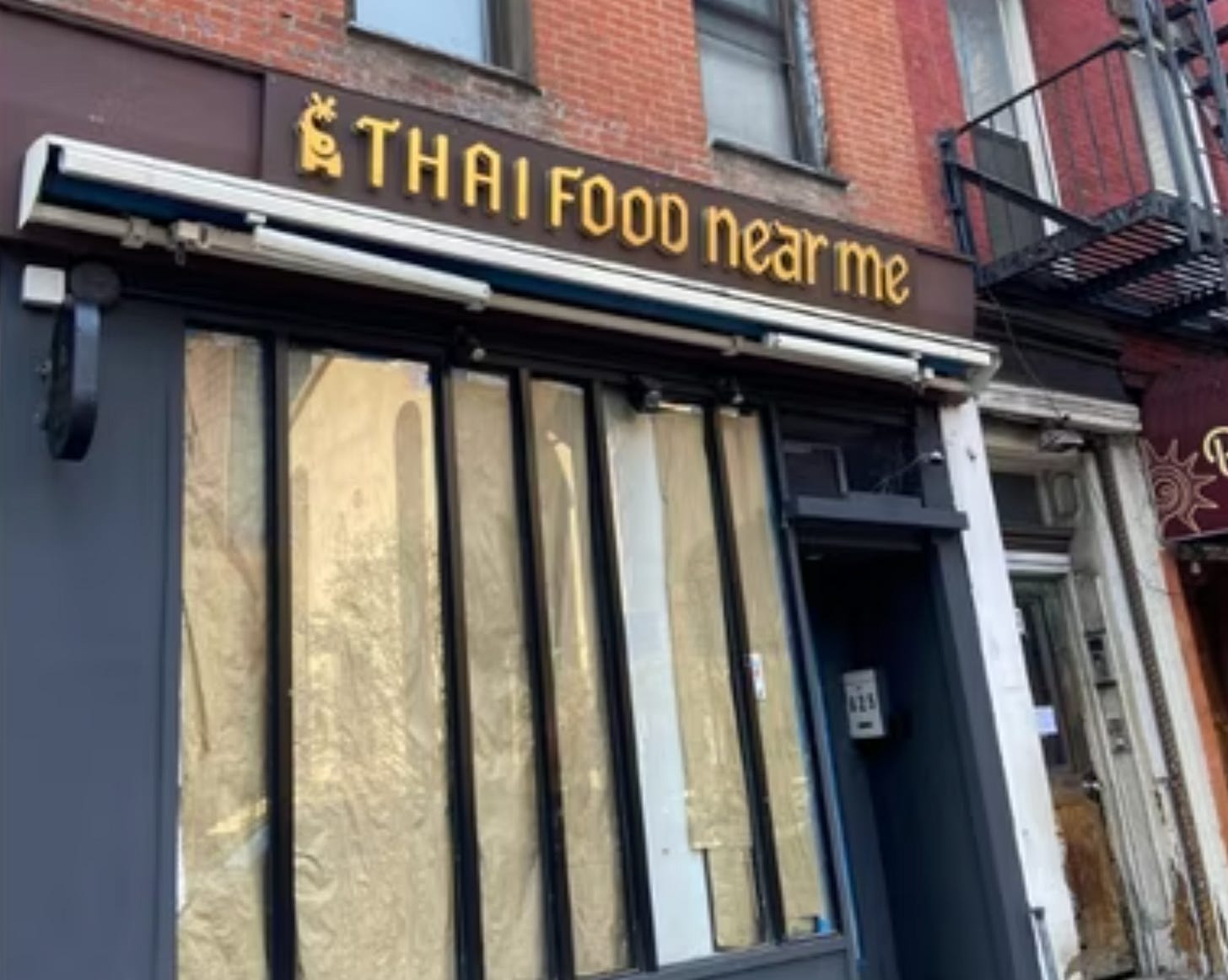The first thing ever bought and sold on the internet was a bag of weed.
In the 70s, MIT and Stanford students would communicate with each other over the ARPANET (U.S. Advanced Research Projects Agency Network), a public packet-switched computer network and research project that later became part of the technical foundation for the Internet. ARPANET was first created and established by Advanced Research Projects Agency and the Department of Defense in 1969 and was declared operational in 1971.
In 1972, the fateful transaction occurred, with a group of Stanford computer science students selling a small amount of weed to their MIT peers, huddled over a brick-like now-vintage computer in their artificial intelligence lab.
I guess we’ll clarify a little.
Maybe “bought and sold” weren’t the right words; this transaction didn’t actually involve money. Instead, the ARPANET was just used to arrange a time and place for the kids to meet to move forward with their deal. But still, you get the idea. History was made!
Nowadays, buying drugs on the internet is a lot of people’s preferred way to do it.
I know lots of people who have ordered shrooms on the internet more than once (big shout out to Canadian OGs ShroomBros), and I know a few people who have ordered harder drugs via the Dark Web.
And since I live in Canada and weed is legal, anyone (over age 19) can just hop on the legal dispensary website and request some BC Bud or 24K Gold with ease. Soon enough, we’ll start seeing pre-rolls on Amazon — we just need the States to hop on the legalization train.
But this is Shroomtown, not Ganjaville, and while we could ruminate about the ills of cannabis criminalization forever, we won’t go too deep into that rabbit hole this time. Nah, not today. Today, we’re talking about buying drugs online. Is it safe? Is it good? Should people do it? We’re talking about serious drugs. And weird drugs. And also the weird fucking MDMA ads I keep getting on Instagram.
The Dark Web
In his book Dopeworld, gonzo reporter and former drug dealer Niko Vorobyov makes the case that the Silk Road (the Dark Web one, not the OG) was a pretty good thing to happen to the drug-using community.
“There was no more risk of getting ripped off or jacked by a mean-looking dude in a back alley; no more drive-by shootings for a piece of turf. The worst you’d get is a nasty email.
Before, when you got ripped off, you’d have nowhere to turn: ‘Hey, uh, that coke you sold us tasted like sherbet.’ ‘Well, you got a receipt motherfucker?’
Here, anyone caught selling crushed-up vitamin pills as Peruvian flake would face the wrath of the eBay-style customer review system, so all the shit-peddlers were taken out of circulation and you’d only be left with the good stuff.”
Now, I’ve never bought drugs off the Dark Web, so I had to reach out to my circle of connections to find out what it’s really like.
And apparently, it’s “amazing.”
An internet friend says he ordered a half kilo of MDMA “a couple of months before summer started in uni. It was one of the dark web marketplaces that opened after the second Silk Road got shut down. I was in uni in the Midwest. I made enough money to travel the entire summer. It showed up discreet. It was a little scary, but I paid someone to receive it. And I bought it from someone who had 1000s of reviews. It was great. But now is not 2015, and a lot has changed since then.”
Would he order again now?
“No need to now. I live in places where good drugs are around. I only did it because I went to a remote school in the Midwest.”
“I wouldn’t do it now,” he continues.
“I would have to research if there’s any legit marketplaces. It’s sad because if everyone ordered online through a marketplace everyone would get better drugs, usually from more ethical criminals, and there would be less fent[anyl] in it all.”
While “ethical criminal” might seem like an oxymoron to some, I have to say, I wholeheartedly agree.
Yes, some drug dealers are scummy and cut their drugs with god knows what, but others, like the ones my friend J Gordon Curtis wrote about in Nashville, are actually doing their part when it comes to keeping users safe and supplied, and routinely test their drugs. Even Dana Larsen, legendary Canadian cannabis and drug reform activist, says he believes dealers come to his Vancouver Get Your Drugs Tested facilities to test their stash before they sell, showing accountability in the underground.
Of course, the Dark Web isn’t this magical place full of pure and clean drugs — but the argument can be made that an online marketplace creates accountability for providers, and that, like with street dealers (or any over-the-counter medication or even alcohol), the onus is partially on the consumer to research dosing and even take it upon themselves to buy testing kits to check for purity.
Research Chemicals
Here at Shroomtown, we like to dive a little deeper into the underbelly of the drug world, and bring our loyal and curious readers up to speed on some lesser-known substances, like 2C-B-FLY and 5-MeO-DiPT. These substances are often classed as “research chemicals,” and while researching these chemicals, we’ve come across some (usually European or Chinese) websites that seem to be selling not just a few substances, but dozens and dozens of them, ones with names we’ve never even heard of.
Now, there are a few things to note here.
One, some of these websites are actual, legitimate websites selling research chemicals for research, not “research.”
Two, some of these websites are just science-fronted drug sellers, who sell all sorts of substances under the guise of research chemicals and avoid blame or accountability as their products are labelled “Not for human consumption” or “for research purposes” only.
But is this enough?
I found one Dutch website selling not just 4-ACO-DMT and LSD — you know, the usual — but also Methaqualone (qualuudes, for all you Wolf of Wall Street bros) pellets and 25B-NBOMe, where it was listed as a “psychedelic drug” with no mention of its highly, highly toxic effects, wherein even small amounts of it have been reported to cause seizures, cardiac arrest, and even death.
Oh, yeah, and this website also sold meth.
Whether or not this website is really intended for researchers, they don’t seem to have any systems in place to ensure only researchers can buy their wares. In fact, searching for the name of the site on Reddit brings up thoughts that the website is a scam, but recommends the user try a different, Canada-based website for their purchase.
The Canadian site sells designer drugs that appeared on the market as late as 2022, including the tricky LSD derivative Valerie, which we’ll talk about in a later Drug Exposé.
It also seems to be more stringent than the Dutch one, with people on Reddit complaining that it used to be more of a free-for-all before it started asking consumers what equipment they’d be using and what research they’re planning to do with these substances. Apparently, another site got raided which triggered the tightening of restrictions on the others.
Still, asking people for their lab equipment doesn’t really deter them — it’s easy enough to Google lab equipment models and fill in the blanks — and in fact, several Redditors have suggested using this method.
On one hand, it might seem good that people aren’t able to access these obscure research chemicals at any whim. On the other hand, we’ve seen that drug prohibition and the War on Drugs have done nothing to deter people from using them and that if people want to do drugs, they’ll just find another way to do it and another source to buy from.
And this is where you get the risks.
American Reddit users claimed they could “trust” the Canadian site, and were now struggling with where to get their research chemicals as nowhere else seemed to ship to the USA.
So what will people do?
Eventually, they’ll find another source.
Or, some of the more ambitious might try to synthesize their chemicals themselves.
Remember, a lot of inventions and creations and misfortunes happen out of necessity. Think about the self-induced bathroom abortions many people had to give themselves, only to end up seriously harming themselves or even dying. This wouldn’t happen in places where abortion is legal, safe, and easily accessible and affordable. Likewise, DIY drugs and the current Tranq epidemic, which turns users’ bodies into giant, rotting flesh wounds, likely wouldn’t happen if the legal market (and society) was more understanding of drug use and less punishing of addiction.
Perhaps the new research chemical that someone tries to make in their studio kitchen isn’t as clean as what they’re used to getting online, or they don’t make the recipe correctly, dosing too high or too low.
Perhaps someone dies as a result of not being able to order clean and safe research chemicals from a long-trusted website.
Who’s really at fault here? And are these websites even a problem?
Drug Dealers
It’s easy to blame drug dealers for the deaths of users and the downward spiral of the thousands, millions even, of addicts who become lost in a narcotics-fueled world that revolves only around sourcing their next hit.
But in my eyes, they’re just businessmen who would exist in any other industry.
You come to the drug dealer.
The drug dealer doesn’t seek you out and shove pills down your gullet and white powder up your nose, hoping to convert you into an addict. Drugs, like people have often said, sell themselves, so for a serious dealer to give away free samples (like we have been threatened with in middle school) in the hopes of securing a long-term customer is just a silly thought.
And why wouldn't you, as a dealer, want to sell a superior product? If not just to ensure the safety of your patrons, but also to acquire those sweet, sweet 5-star reviews that’ll keep you in business (if you’re online), or to get that word-of-mouth recommendation that so many companies rely on?
Still, the world needs a bogeyman, and if these websites end up getting more mainstream attention, I think they could end up taking the brunt.
Who’s easier to blame than a faceless villain?
I didn’t name the Dutch and Canadian research chemical websites here because I didn’t want it to feel like I was naming and shaming, but I also didn’t want to give anyone an easy link to go and buy some ‘luudes’ for 10 Euro, either.
That said, sites like this aren’t too hard to find — they’re probably on the Dark Web, too, but these two that I used as examples for this article were just floating around on the normal internet, existing peacefully.
You can Google “research chemicals online” and be brought to a whole flurry of websites that specialize in obscure and weird pills and powders, who might only be too happy to ship them over right to your doorstep if you tell them what equipment you’ll be using to research them with (apparently your mouth doesn’t count).
And is this so wrong?
Again, can we fault these websites and companies more or less for the same as any local street dealer? Or any modern-day website that sells shrooms, or even any cannabis dispensary?
While I do believe we work in harm reduction as people in the psychedelics and drug space, how much do these websites really owe their customers other than the (very clear) “not for human consumption” disclaimer and a few brief sentences about the substances they’re selling?
If folks are using them off-label, these supplies are devoid of fault — technically, they did what they had to do.
Right?
Why Am I Getting Ads For MDMA On Instagram?
The other day, while I was in the middle of my daily Instagram scroll, I was hit with a weird ad.
It was an anime-style drawing of a horse in a suit in a lab.
The copy told me to “enhance” my “rave experience.”
I tapped on the ad, and was immediately brought to a website selling MDMA capsules online.


As I perused the site, I was intrigued by its menu of offerings.
I guess I am not the target market here because I thought MDMA was just MDMA, but it turns out that there are different kinds of MDMA, each with a special name.
The website boasted about its colourful offerings: Blue Freezie MDMA, which I had never heard of before (a Google search of the name brought me to another website selling it, also labelling it “Therapeutic MDMA,” although what exactly makes it that is unknown. I hardly think therapists are purchasing Blue Freezie molly off a website that also sells crypto and cannabis, but I guess you never know these days), Mario’s Cap molly, which just looked like MDMA dyed red, Limitless molly (yellow), all with a description explaining the dosage and that MDMA “can be dissolved in water and swallowed, mixed with a drink and sipped, or snorted,” which, for all of you who have had the misfortune to snort molly in the past, know that while it is certainly possible, it’s definitely not ideal.
Anyway, not too much more to say about this — I just wanted to point out that Meta claims to have such stringent policies on what can and can’t be advertised and posted, to the point where comedian and satirist Dennis Walker, who you might know as Mycopreneur, has his 25k profile permanently removed for talking about legal South African plant kanna, but ads for MDMA are seemingly allowed to slip through the cracks.
Personally, if I were looking for it, I wouldn’t buy MDMA from here, knowing that the Dark Web is probably a much safer place to get it, but you do you. I wonder if these ads actually work. I mean, I clicked on it. But how many people end up making the purchase? If you have, please, please, please let us know in the comments (and yes, I know I’m sharing the URL of this place, but it’s with a warning — I really don’t think this is the spot).
I will say this, though — great job to these guys on their SEO. Owning buymdmaonline.com is pretty top-notch. It’s like that “Thai food near me” place. Genius.
Is It Safe To Buy Drugs Online?
This is a tricky question because the answer is a bit of yes and no.
First of all, we don’t advocate for the use of illegal substances or drugs. But we do advocate for the human right to explore your own consciousness, and to do with your own body whatever you please. And if that looks like a four-day bender to you — we don’t support that or defend it, but we defend your right to do that.
Or whatever Voltaire said.
Secondly, as workers and writers in the drug and psychedelics space, we advocate above all for harm reduction. Sure, do whatever you want, but try to have a self-care plan in place, test your stuff, tell a friend, and make sure you know what you’re doing (if you scroll to the bottom of this post, we have a small list of harm reduction tactics you can use to protect yourself when taking substances. Of course, nothing is 100% safe, but you can add some layers).
And thirdly, if you do plan on buying drugs online, again, the harm reduction comes in here — please do your research and buy from a reputable company (we mentioned ShroomBros here as one of Canada’s premier shroom hubs).
In the end, buying drugs online is now as normal and common as texting your local dealer (also, why is every coke and weed dealer named Jay?) and meeting at the corner. Technology and humans are advancing, we’re more antisocial than ever, and if people can get their breakfast, lunch, dinner, groceries and toilet paper delivered right to their door, then why the fuck wouldn’t they want their vices to come in the same convenient way?
At first, buying drugs online probably seems dangerous and sketchy — you’re giving people your credit card information, your money, your ADDRESS, and, in the case of these research chemical websites, often your ID.
But as most people have seen, oftentimes, these websites don’t want anything from you but your cash, and most folks just end up getting a discreetly wrapped package in the mail a week after ordering and no other contact, except for an email newsletter every month or so advertising the current deals.
It’s been interesting to see the drug world shift in the last 20 years, from your local street dealer offering you a better price if you were a regular on some good bud to being signed up to an online shroom dispensary’s website that offers discount codes, a referral system, points, and Easter deals, all in slickly designed packaging and careful, thoughtful branding.
Mushroom, DMT, and ayahuasca enthusiasts often shy away from using the word “drug” to describe their wares, preferring the New Age-y “medicine,” but that doesn’t change the fact that the stuff they’re peddling is generally mind-altering substances, and they’re still a drug dealer.
And why can we call Flower the Shaman a “medicine woman,” but Jack the heroin plug is a criminal for supplying the stuff to users on the street? Why are internet marketplaces considered to be the problem when comes to acquiring drugs?
It could be argued that this is even safer than a street dealer — like Niko said about the Silk Road, curious would-be shoppers can now read reviews from other customers, or peruse the trusted Reddit for stories of websites that are real vs. scams, or ones that provide fast service and good quality product. The internet has brought the research chemical and general drug exploring world a lot closer together, and has created ways for people to vet suppliers that didn’t exist before. Call it what you will, but we’re calling it harm reduction.
If the first transaction on the internet was for drugs, it’s safe to say they very well belong there, and who knows? Perhaps the last transaction on the internet will be drugs as well. Perhaps this is what it was made for.
Harm Reduction
When experimenting with new drugs and substances, it’s important to prioritize your safety, even above your curiosity.
Don’t mix drugs
Experiment and do an allergy and reaction test with a small dose first
Do a lot of research so you know what dose you want to try and have an idea of what you’re getting yourself into
Consider having a trip sitter around you for your first time or let someone know what you’re doing
Make sure you’re in the right mindset and environmental setting
Test your substances to make sure the synthesis is pure and contains no potentially toxic or harmful additives
Only go for obscure phenethylamines if you already have a lot of prior psychedelic experience.
Know your dose, pay attention to research and instructions, and measure responsibly.
Sofie Mikhaylova is a psychedelics, pop culture, and travel writer, among other things. Her writing has appeared in Vice, leafie, Psychedelic Spotlight, The Washington Post, Fodor's Travel, Double Dot Magazine, and more. Find her on Instagram, her newsletter Sofieland, her podcast Sofieland, and her website.

